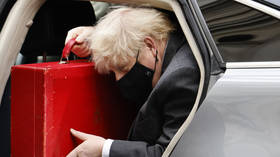A £41 billion divorce bill? The UK has already paid half a trillion pounds to the EU & shouldn’t pay a penny more

Even though the United Kingdom has left the European Union, Brussels remains determined to make an example of it and is requesting an extortionate settlement fee. Boris Johnson must stand firm and refuse to accept its demands.
The UK and the European Union are now at loggerheads over the former’s financial settlement, or the Brexit ‘divorce bill’ as it commonly known. Brussels is demanding a whopping £41 billion, yet the UK government claims that the bill should only be between £35-£39 billion. We now have a Mexican stand-off, with both sides refusing to give way.
On Friday, a European Commission spokesman announced that the £41 billion figure was “correct” and that “we have absolutely no indications at this point in time that the bill, or the amount that we've calculated, will be contested.” If the EU believed that this demand would not be contested, then it is sorely mistaken. In response, a UK government spokesman stated that “we don't recognise that figure, it's an estimate produced by the EU for its own internal accounting purposes ... our estimate remains in the central range of between £35-39bn and we will publish full details in Parliament shortly.”
You have to hand it to the EU, as it is both persistent and consistent. Back in 2017, Brussels suggested that it wanted a 50 billion Euro divorce fee. Although this was derided by many Conservative MPs at the time, former PM Theresa May agreed to pay this (amounting to £39 billion) in December 2017. Fast forward to October 2019, and no figure was mentioned in Boris Johnson’s Withdrawal Agreement with the EU. It was, however, generally agreed that the calculation would result in the UK paying 40 billion euros (broadly £32.8 billion), some 10 billion euros less than the 2017 figure. It is all very complicated, and billions of pounds are being tossed around as if they were pennies or cents.
For me, however, whether it is £35, £39 or £41 billion is irrelevant, as all these figures represent a gross overpayment. In fact, they amount to more than double what the UK government allocates to the police, and £41 billion is almost equal to the annual defence budget. For my part, I do not believe that the UK should be paying any divorce fee, a point I argued on television during the 2017 General Election campaign. Allow me to explain.
Between 1973, when the UK joined the then European Economic Community (EEC), we have contributed well in excess of £500 billion to the EU’s coffers. Indeed, in the final years of the UK’s membership, we were paying £19 billion a year into the Brussels budget. If both the British rebate, negotiated by PM Margaret Thatcher, and EU monies spent in the UK are taken into account, the net figure remained a massive £13.2 billion every year. In the years that the UK was in the EU, only Germany paid more into the budget. Now I think we can all agree that this is not small change, and the UK has more than pulled its weight over the years. I therefore fail to see any rational argument why it should hand over any more cash.
Also on rt.com Five years after the Brexit referendum, we have an imperfect deal from an imperfect PM, but I’m still sure we made the right callThe EU’s financial demands are exorbitant, because they have to be. The divorce bill forms part of a wider plan concocted in the corridors of Brussels to punish the UK for having the temerity to leave the EU. It is also designed to prevent other nations from following suit, which would potentially cause the project to disintegrate. Indeed, for many smaller nations, the EU has become the equivalent of Hotel California, because as the Eagles sang, “you can check-out any time you like, but you can never leave!” The divorce bill is therefore a form of self-protection for the EU and an attempt to make an example out of the UK.
Boris Johnson, however, cannot afford to bow fully to the EU’s demands. He is already under pressure from Brexiteers who only accepted his deal through gritted teeth. Andrew Bridgen, the Conservative MP for North-West Leicestershire, stated that “it comes as no surprise that the EU wants to screw every penny out of us and the bill is going up and up.” Bridgen also suggested that the dispute could result in the UK walking away from the Withdrawal Agreement. Patience is clearly wearing thin.
But it is not all bad news for the PM. Disputes with Brussels play well with the British public and increase support for his government. Moreover, when the EU makes what is perceived to be unreasonable demands, it convinces the British public that they made the right decision to leave back in 2016. Expect the PM, who is a cunning political operator, to milk the situation for all its worth.
In an ideal world, I would love Johnson to tell the EU that we have paid enough over the years, and that we will not be ripped off when checking out of Hotel California. But we do not live in a perfect world and politics, as Otto von Bismarck said, is “the art of the possible.” The result will therefore be a cobbled together compromise; but in the meantime, expect the UK government to make the most of the situation.
If you like this story, share it with a friend!
The statements, views and opinions expressed in this column are solely those of the author and do not necessarily represent those of RT.














